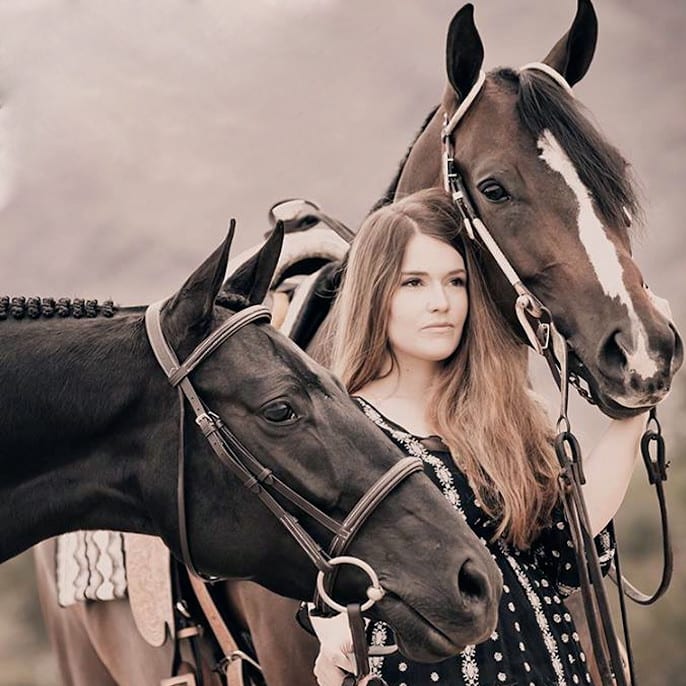It’s the time of year when many horse owners are beginning to consider their choice of stallions for breeding their mares. Others are likely scouring websites and online forums for sale horses with the potential to become their next show partner.
The industry is packed with people who fill their show barns by way of homegrown breeding programs. Yet, raising show horses is not an easy prospect. It requires real estate, time, and, as with all equine endeavors, hefty bills. Perhaps that’s why so many choose to purchase horses that are ready to hit the pen loping.
GoHorseShow spoke with several top exhibitors about why they’ve chosen their selected path in the industry, and how they work to achieve their goals whether their horses were born on home soil, or purchased with specific plans in mind.
Cathrin Gutmann
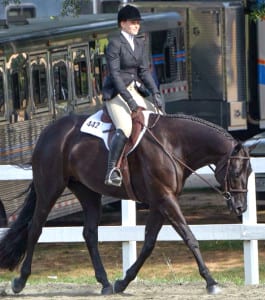 International competitor Cathrin Gutmann resides in Austria, at Gut-Jaidhof, her family estate. Gutmann, who got her start in the classical dressage arena, keeps several show horses at her estate near Vienna and enjoys showing on the European circuit. She shares, “My main focus for the upcoming show season will be showing in the U.S. where I currently keep three show horses.”
International competitor Cathrin Gutmann resides in Austria, at Gut-Jaidhof, her family estate. Gutmann, who got her start in the classical dressage arena, keeps several show horses at her estate near Vienna and enjoys showing on the European circuit. She shares, “My main focus for the upcoming show season will be showing in the U.S. where I currently keep three show horses.”
Gutmann’s strategy blends a bit of both approaches as two of her U.S. horses were purchased, and one is homebred. In her view, there are benefits and challenges to each route. “The good thing about buying a show horse that already has a record and is ready to show is that you can literally jump on and start showing. You don’t have to wait for it to grow up to see what you have. Of course, you’re going to spend more money on such a horse, but you’re buying proven quality and not a chance.”
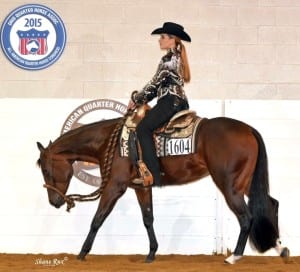 Gutmann placed her bets on proven quality when she purchased World Champion, Boys Move Over (pictured above right), in 2014. The 2011 black mare had recently won the Junior Hunter Under Saddle at the AQHA World Show with Nancy Sue Ryan in the irons. Gutmann was able to carry on the mare’s success at the 2015 World show, taking home a Top Ten finish in Amateur Hunter Under Saddle.
Gutmann placed her bets on proven quality when she purchased World Champion, Boys Move Over (pictured above right), in 2014. The 2011 black mare had recently won the Junior Hunter Under Saddle at the AQHA World Show with Nancy Sue Ryan in the irons. Gutmann was able to carry on the mare’s success at the 2015 World show, taking home a Top Ten finish in Amateur Hunter Under Saddle.
She goes on to say that her recent experience with her three-year-old gelding, Hot Boy Gone Lazy (pictured left), has altered her view on campaigning home raised horses. Recently, Gutmann and the gelding by, No Doubt Im Lazy, made the finals of the 3YO Non-Pro Western Pleasure at the All American Quarter Horse Congress, being the first European bred horse to do so. “Now that my first homebred gelding is hitting the show pen I can relate to every other breeders’ excitement when a horse you bred does well and shows promise.”
Mimsi and Thomas Coon
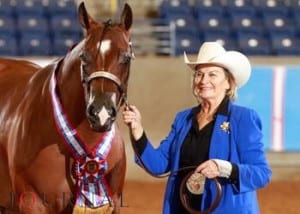 Halter exhibitors Thomas and Mimsi Coon of Pilot Point, Texas take a mixed approach when it comes to acquiring their show stock. “We do breed a few mares, as we like to see the babies grow into good individuals,” Mimsi Coon shares. She adds, “When you’re fortunate enough to own several, multiple world champion mares it’s nice to continue their careers as broodmares and see what they’re capable of producing.”
Halter exhibitors Thomas and Mimsi Coon of Pilot Point, Texas take a mixed approach when it comes to acquiring their show stock. “We do breed a few mares, as we like to see the babies grow into good individuals,” Mimsi Coon shares. She adds, “When you’re fortunate enough to own several, multiple world champion mares it’s nice to continue their careers as broodmares and see what they’re capable of producing.”
The Coon’s don’t look only to the breeding barn when acquiring new talent. Several of their horses were purchased under the expert guidance of their trainer Ted Turner. According to Coon, “When buying, we look at each horse with Ted. We prefer horses with pretty heads and necks, sound legs and overall balance. Also, they must display a kind disposition.”
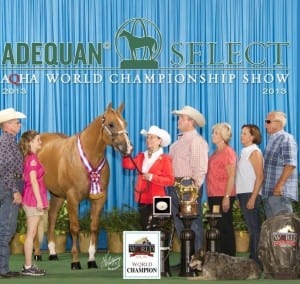 Coon says the buying process is less stressful when there is no strict deadline in place. “We don’t place a time frame on looking; it makes the process stressful instead of fun. I guess we’ve been blessed with making good selections, because we’ve been blessed with many wins.”
Coon says the buying process is less stressful when there is no strict deadline in place. “We don’t place a time frame on looking; it makes the process stressful instead of fun. I guess we’ve been blessed with making good selections, because we’ve been blessed with many wins.”
Those wins include Mimsi’s Select World Championship in Two-Year-Old Mares with, Dream Big Dreams. Her husband then went on to win the same class at the AQHA Amateur World Show. Perhaps the key to the Coon’s success has been the diversity in their show program. The pair acknowledges the risks involved with breeding.
“There are heartbreaks with raising your own. You can lose the foals and/or the mares,” Coon says. She adds, “The younger the horse, the more things can change in unexpected, and often unwanted ways. However, we’ve enjoyed earning several World and Reserve World titles with several different weanlings.”
For the Coons the thrill of making it to the winner’s circle is rewarding, no matter the path they took to get there.
Stephanie Richardson
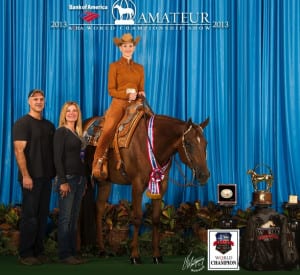 Stephanie Richardson hails from Wilsonville, Oregon where she raises and competes solely with homebred horses. In 2013, Richardson won a World Championship title in Amateur Horsemanship with her current partner, Kickin Axe in Levis. Richardson shares that raising her own horses is important to her, and she sees her horses as her kids. “I am married, to a very supportive husband, and have a small farm with six horses. I work full time, but I spend several hours a day with my horses,” Richardson says.
Stephanie Richardson hails from Wilsonville, Oregon where she raises and competes solely with homebred horses. In 2013, Richardson won a World Championship title in Amateur Horsemanship with her current partner, Kickin Axe in Levis. Richardson shares that raising her own horses is important to her, and she sees her horses as her kids. “I am married, to a very supportive husband, and have a small farm with six horses. I work full time, but I spend several hours a day with my horses,” Richardson says.
For Richardson, owning and showing a talented mare was the impetus for beginning a breeding program. “I had a mare, Lazy Levis, who I adored. She had a strong show record with over 1,300 points, most of which I put on her, so I thought she could potentially produce something. Levi had a certain look and way of going that I liked for horsemanship, so I wanted to try to breed for something like her for a future replacement.”
That replacement brought Richardson huge show ring success. Yet, she admits that breeding a beloved mare brings many worries and potential challenges. From deciding what stallion to match with the mare, to gauging the eventual foal’s development and potential. She shares, “When picking a stud, I spent more time second guessing myself. Also, I grow way to close to the babies and find it extremely difficult to part with them, ultimately keeping too many. Another challenge is that you have to hold on to them for a few years before you know if the foal will be a good match for you in the show pen.”
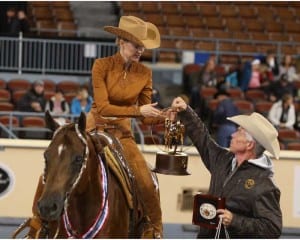 Though many who breed and raise their own show partners still send the horse out for professional training, Richardson did much of the work with “Charles” herself. “He was started with my trainer, Kristy McCann, to get a solid foundation and introduction to lead changes. Then, I brought him home for a year to add and focus on horsemanship.”
Though many who breed and raise their own show partners still send the horse out for professional training, Richardson did much of the work with “Charles” herself. “He was started with my trainer, Kristy McCann, to get a solid foundation and introduction to lead changes. Then, I brought him home for a year to add and focus on horsemanship.”
Granted, the training process always comes with challenges and setbacks, but Richardson says that showing a horse she raised made her that much more determined to get the gelding to the show pen. “I was on a mission to get something out of my mare to take to the show ring; Charles showed potential early on so we stuck with it.” For her, showing, and winning, with her own horses makes the experience doubly rewarding. “I know I feel a closer connection with my horses since I’ve raised them. For me, that’s part of the appeal of breeding.”
Jason Wanderer
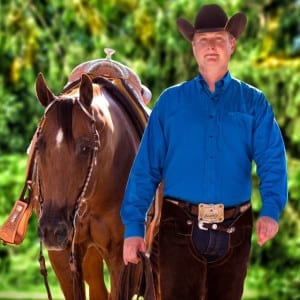 Jason Wanderer competes in Amateur Western Riding. For him, raising his own show horses has never been an attractive option. Wanderer, who lives in Los Angeles, California, shows his sixteen-year-old gelding, Zippos Petite Prince, under Nancy Renfro’s guidance.
Jason Wanderer competes in Amateur Western Riding. For him, raising his own show horses has never been an attractive option. Wanderer, who lives in Los Angeles, California, shows his sixteen-year-old gelding, Zippos Petite Prince, under Nancy Renfro’s guidance.
Like many amateurs, Wanderer waited until the time was right in his professional life to purchase his horse of a lifetime. He says, “Due to positive life circumstances—the sale of my business—I was at a place where, for the first time ever, I had the time and finances to fulfill a life long dream. Therefore it was critical that the horse be ready for me to show in the western riding from the start.”
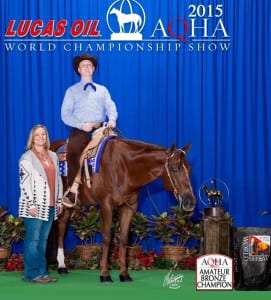 In 2014 dreams came true when Wanderer and “Winston” were named Reserve Congress Champions in Amateur Western Riding. Purchasing a horse with skills that aligned with Wanderer’s goals was essential.
In 2014 dreams came true when Wanderer and “Winston” were named Reserve Congress Champions in Amateur Western Riding. Purchasing a horse with skills that aligned with Wanderer’s goals was essential.
Having a desire to primarily focus on the western riding I sought out an experienced partner in the event that would allow me to further my skills, become a better rider, and show at the highest competitive level possible,” Wanderer shares.
Everyone’s horse showing journey is different. Wanderer wanted to take as much chance out of the equation as possible. When asked if he’d ever consider breeding, Wanderer said it’s not likely. “I am very conservative and not a gambler.” He goes on to say, “When my non-horse friends ask me why don’t I breed horse, I use this metaphor—if you had one hundred children what are the chances that even one would be an Olympic Gold Medalist?”
Camilla Cumberland
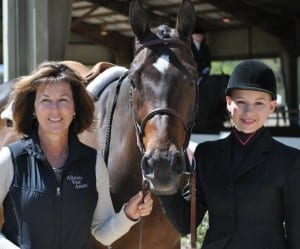 It should come as no surprise that experienced breeder Camilla Cumberland likens raising a champion to winning the lottery. “Breeding is sometimes like playing the lottery. You can have the best mare and the best stallion and still get an average baby.” Luckily for Cumberland, she’s hit it big more than once. Horses she has raised—or purchased as weanlings—including, What About Bob, Better By The Minit, All That Chas, and The Big Adventure, have gone on to win multiple Congress and World championships.
It should come as no surprise that experienced breeder Camilla Cumberland likens raising a champion to winning the lottery. “Breeding is sometimes like playing the lottery. You can have the best mare and the best stallion and still get an average baby.” Luckily for Cumberland, she’s hit it big more than once. Horses she has raised—or purchased as weanlings—including, What About Bob, Better By The Minit, All That Chas, and The Big Adventure, have gone on to win multiple Congress and World championships.
Choosing to show homebred horses, or buy prospects as weanlings, is leaving a lot to chance. “The breeding business can be heartbreaking. Every baby out of the same mare can be completely different. Of course, you can have babies get sick, incur costly injuries, and sometimes they can just die. When one you raised makes it to the show pen, even if you’re not the winner, it just makes you feel more accomplished. “Cumberland says.
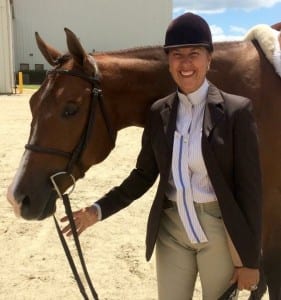 Her breeding philosophy mirrors that of many with small, home based, operations. She shares, “My breeding operation is extremely small and getting smaller. I started with three mares; now I am down to two. It requires a lot of work and time. I try to breed my mares to stallions I think will complement them, or be stronger in the traits my mares are weak in.”
Her breeding philosophy mirrors that of many with small, home based, operations. She shares, “My breeding operation is extremely small and getting smaller. I started with three mares; now I am down to two. It requires a lot of work and time. I try to breed my mares to stallions I think will complement them, or be stronger in the traits my mares are weak in.”
Many breeders would probably agree that because raising horses is such a personal process, deciding when to sell is especially challenging. Cumberland agrees, saying, “I certainly feel a closer connection with the horses I have raised. It is harder to sell them. But, it is also super exciting to see one you raised go on and do well. It’s like being a proud parent.”
No matter what direction you take in the horse show industry, all of those interviewed would likely agree that being surrounded by quality animals is what makes competing fun. Whether showing a homegrown horse, or one you purchased with specific goals in mind, the road to the ring can be fraught with frustration. But, that’s what makes finding success with our equine partners all the more satisfying, no matter what shape the journey takes.


